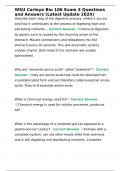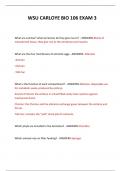Bio 106 wsu carloye - Study guides, Class notes & Summaries
Looking for the best study guides, study notes and summaries about Bio 106 wsu carloye? On this page you'll find 31 study documents about Bio 106 wsu carloye.
Page 2 out of 31 results
Sort by

-
Bio 106 WSU Carloye Exam #4 | Questions with 100% Correct Answers | Verified | Latest Update 2024
- Exam (elaborations) • 6 pages • 2023
-
- $8.49
- + learn more
What is the difference between blood and hemolymph? - Blood: In a Closed circulatory system and is confined to vessels. Hemolymph (AKA interstitial fluid): In an Open circulatory system and bathes the body cells. What are the major types of blood cells? - red and white cells What adaptations allow an animal to use diffusion across its skin as the only mechanism for gas exchange? - The animal must be thin and have a large surface area. Animals that only diffuse across the skin have a dense ...
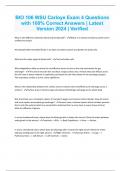
-
BIO 106 WSU Carloye Exam 4 Questions with 100% Correct Answers | Latest Version 2024 | Verified
- Exam (elaborations) • 6 pages • 2024
-
- $8.49
- + learn more
What is the difference between blood and hemolymph? - Blood: In a Closed circulatory system and is confined to vessels. Hemolymph (AKA interstitial fluid): In an Open circulatory system and bathes the body cells. What are the major types of blood cells? - red and white cells What adaptations allow an animal to use diffusion across its skin as the only mechanism for gas exchange? - The animal must be thin and have a large surface area. Animals that only diffuse across the skin have a dense ...
WSU Carloye Bio 106 Exam 3 Questions and Answers (Latest Update 2024)
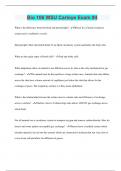
-
Bio 106 WSU Carloye Exam #4 | 2023 | 50 Questions with 100% Correct Answers | Updated & Verified
- Exam (elaborations) • 9 pages • 2023
- Available in package deal
-
- $11.49
- + learn more
What is the difference between blood and hemolymph? - Blood: In a Closed circulatory system and is confined to vessels. Hemolymph (AKA interstitial fluid): In an Open circulatory system and bathes the body cells. What are the major types of blood cells? - red and white cells What adaptations allow an animal to use diffusion across its skin as the only mechanism for gas exchange? - The animal must be thin and have a large surface area. Animals that only diffuse across the skin have a dense ...
WSU CARLOYE BIO 106 EXAM 3 QUESTIONS AND ANSWERS 2024

-
WSU Carloye Bio 106 Exam 3 With 100% Correct Answers 2023
- Exam (elaborations) • 9 pages • 2023
- Available in package deal
-
- $11.79
- + learn more
WSU Carloye Bio 106 Exam 3 With 100% Correct Answers 2023
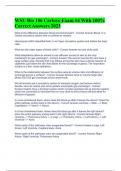
-
WSU Bio 106 Carloye Exam #4 With 100% Correct Answers 2023
- Exam (elaborations) • 5 pages • 2023
- Available in package deal
-
- $11.29
- + learn more
WSU Bio 106 Carloye Exam #4 With 100% Correct Answers 2023
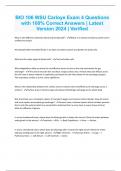
-
BIO 106 WSU Carloye Exam 4 Questions with 100% Correct Answers Latest Version 2024 Verified
- Exam (elaborations) • 6 pages • 2024
- Available in package deal
-
- $8.99
- + learn more
BIO 106 WSU Carloye Exam 4 Questions with 100% Correct Answers | Latest Version 2024 | Verified What is the difference between blood and hemolymph? - Blood: In a Closed circulatory system and is confined to vessels. Hemolymph (AKA interstitial fluid): In an Open circulatory system and bathes the body cells. What are the major types of blood cells? - red and white cells What adaptations allow an animal to use diffusion across its skin as the only mechanism for gas exchange? - The animal m...

-
WSU Carloye Bio 106 Exam 3 | 100 Questions with 100% Correct Answers | Verified | Latest Update 2024
- Exam (elaborations) • 11 pages • 2024
- Available in package deal
-
- $10.49
- + learn more
Describe each step of the digestive process, where it occurs, and how it contributes to the process of digesting food and extracting nutrients. - Chemical digestion by gastric juice is caused by the churning action of the stomach. Muscle contractions and relaxations mix the stomach every 20 seconds. This and enzymatic activity creates chyme. Both ends of the stomach are usually sphinctered. Why are "essential amino acids" called "essential"? - they are amino acids that must be obtained ...
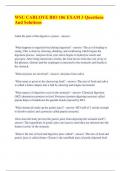
-
WSU CARLOYE BIO 106 EXAM 3 Questions And Solutions
- Exam (elaborations) • 12 pages • 2024
-
- $11.89
- + learn more
WSU CARLOYE BIO 106 EXAM 3 Questions And Solutions Label the parts of the digestive system. - answer - What happens to ingested food during ingestion? - answer -The act of feeding or eating. This is done by chewing, drinking, and swallowing which begins the digestion process. Amylase from your saliva begins to hydrolyze starch and glycogen. After being turned into a bolus, the food moves from the oral cavity to the pharynx, (throat) and the esophagus (connected to the stomach) and fi...

How much did you already spend on Stuvia? Imagine there are plenty more of you out there paying for study notes, but this time YOU are the seller. Ka-ching! Discover all about earning on Stuvia

